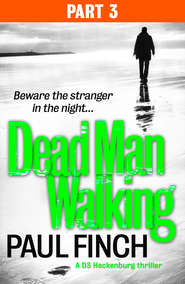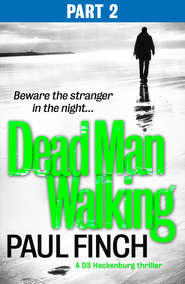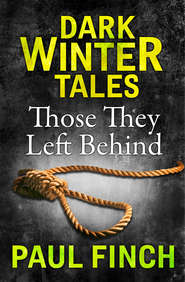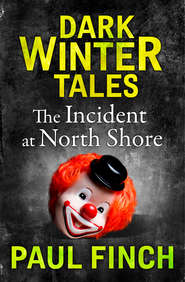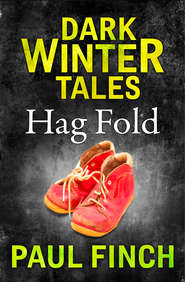По всем вопросам обращайтесь на: info@litportal.ru
(©) 2003-2025.
✖
God’s Fist
Автор
Год написания книги
2019
Настройки чтения
Размер шрифта
Высота строк
Поля
The message of that wasn’t lost on Hoggins. “Oh dear. Trixie?”
“She’s fine. I get access once a week.”
“Sorry to hear that, Ray.”
Hoggins’s commiseration seemed genuine enough, but Skelton knew that it wasn’t. Len Hoggins was just about the most disingenuous person he’d ever met.
“It’s alright,” the ex-cop said. “Life’s a lot quieter.”
“Suppose so. Anyway … where you living these days?”
“Got a flat down Bagley End.”
Hoggins nodded, his expression neutral – clearly unsure whether further pity (because Bagley End was seven blocks of semi-derelict council tenements, and basically a junkie sewer) would be welcomed, or whether it would be deemed an insult because it openly implied that Skelton now really had sunk to the bottom of the pile. “So, this is … this is what you do, then?”
“Yeah. It’s labouring, mostly.”
“It’s certainly keeping you in shape.”
Skelton nodded. His dusty t-shirt did little to conceal his broad chest, bull neck and massive arms and shoulders. “I always liked to work out.”
“Yeah … I remember.”
Jervis approached, tapping his watch. “Ray … time, eh!”
“I’d better get on,” Skelton said.
Hoggins slapped him on the shoulder. “Yeah, well … it’s good to see you again, Ray. Presumably we’ll keep running into each other while the move’s on?”
“Very possibly,” Skelton replied, moving away. “See you.”
*
That evening, when he got back to his flat, Skelton stripped down to his jockey shorts and went into the bathroom. He was thirty-five years old and stood six feet, three inches tall. He was very strongly built; according to the scales he weighed fifteen stones, seven pounds, and thanks to his dedicated fitness programme, none of that was flab. He looked at himself in the mirror. His hair was still jet-black, almost oily, but at present unruly and badly in need of a trim. Thick, black sideburns ran down either cheek; the face in between them, once reasonably handsome, was now pitted and stony.
Skelton went back into his pokey little lounge. Its furnishings were sparse – an armchair, a single wardrobe, and a chest of drawers with a portable TV on top. Beside the small electric fire, there was a variety of weights and dumbbells. Skelton got to work on them straight away, breaking off only to flick on the early evening news, which wasn’t particularly uplifting. The latest batch of Middle East peace talks were floundering – the body count in the streets grew alarmingly as the region’s so-called statesmen haplessly bickered; an Iowa gun-buff had committed fourteen murders as he strode through a shopping mall, shooting people at random – later investigation revealed that he’d held his cache of high-powered weapons entirely legally; a British MP had been exposed for loitering in public toilets and behaving indecently with young men. The leader of his party had gone on air to describe the incident as “a great personal tragedy” – for the MP, not, it seemed, for his wife and kids. Skelton watched and listened in silence as he exercised, his torso gleaming with sweat, his deltoids and pectorals – already hugely developed – now bulging all the more as blood suffused them, his biceps hardening, standing out like wood, the veins showing in them as thick as cable.
Later on, after he’d showered and changed, and eaten his usual evening meal of poached eggs, fruit and rye bread without butter, Skelton called Mary. A man answered the phone who Skelton didn’t recognise; he was young, with a loutish Manchester brogue. “Yeah?”
“Is Mary there?” Skelton asked.
“Who wants to know?”
“Her ex-husband. Who are you?”
“A friend.”
“Okay. So is she there?”
“Er … I’ll just see.”
“You don’t need to sound so worried,” Skelton advised him. “I’m not planning on coming round.”
“I’m not worried. Why should I be worried?”
“Just get Mary. I haven’t got all night.”
When Mary finally came on, she didn’t sound particularly enamoured.
“What is it?” she asked.
“I see you’ve got company.”
“What’s that to you?”
“Nothing. I just hope Trixie’s being treated with the respect she deserves.”
“We’re not bonking next to her playpen, if that’s what you mean.”
“Glad to hear it, though it’s a pity you’re bonking at all. That dickhead sounds fifteen years younger than you.”
“Ray, have you just rung up for a fight, or what?”
“No.” He paused. “No … I just wanted to let you know I’ll be okay for Sunday.”
“You’re always okay for Sunday. Why are you bothering ringing to tell me that?”
“Perhaps I just wanted to hear your voice.”
“Well I don’t want to hear yours. So if that’s it, I’ll go.”
“That’s it,” he said.
Empty airwaves buzzed in his ear. She hadn’t bothered to say goodbye.
Later that evening, Skelton walked across town to the ten-screen multiplex, where the latest Hollywood blockbuster was showing. From the very outset it was a blood-streaked ballet. Men were mowed down like watermelons, shot spectacularly to pieces, dying in elaborate patterns of slo-mo carnage. At every instant of course, the hero scowled and frowned through his commando face-paint, and shook off his bumps and bruises, and pumped his trigger finger, and threw in the odd quip, and stamped on heads and punched guys out and slashed and hacked and kicked them to oblivion, and left trails of exploding cars and buildings in his wake. The whole thing was a dazzling display of pyrotechnics, the endlessly expanding fireballs glaring red and orange on the mesmerised audience, the quadraphonic sound system thundering above, beside, below, the gunfire rattling from cinema wall to cinema wall, the very seats vibrating …
It might have been impressive, Skelton thought as he left the cinema, if he hadn’t seen it all so often before. He felt numb to that kind of thing now. He supposed it would be the same on the world’s most death-defying roller coaster. If you tested it twenty times a day, the adrenalin would soon stop pumping. Of course, if you rode it twenty times a day, you would also increase your chances of being involved in a terrible accident, as well. That was worth thinking about.
By the time he got back to his neighbourhood, the girls had started to appear: haggard scarecrow shapes on the dingy street-corners. The dealers were abroad too: dark outlines in graffiti-covered doorways. It was only ten o’clock, but drunks were in evidence, slumped against the grilled shop fronts or lying senseless on the litter-strewn pavements. There were raucous sounds from the pubs. From one of them – The Mechanics, a scummy little drinking-hole squashed under a railway bridge – a stool came hurtling through the window, curses and screams accompanying it.
Skelton ignored it all. He let himself into his flat without a backward glance. No-one in this district really knew him, but his look alone was enough to dissuade the opportunist muggers and addicts, while the crumbling block in which he lived hadn’t seen a decent burglary in several years because, let’s face it, what was in there to pinch? Of course, there were certain other creatures, in more distant parts of the city, who might well give Ray Skelton hassle, and worse. As a copper he’d never knocked on the custody office door if he could smash his latest prisoner’s face into it instead, while all his arrests – even those for minor offences – had been made with the maximum use of thumb-in-the-eye and knee-in-the-groin, because he’d always believed in leaving the toe-rags no illusion about what breaking the law on his manor meant. Yes, there were many individuals who’d be interested to know where he now lived, though the British police didn’t willingly issue such information, not even when it concerned an officer they’d eventually, angrily, dismissed from service.
Back indoors, Skelton made himself a mug of tea, set his alarm clock for six, and then, as was his habit, turned in early. For once though, he didn’t settle down in bed with a Jack Higgins or Robert Ludlum; he settled down with three glossy black-and-white photographs. He looked at them again, hard, letting his mind wander. There were so many injustices in the world that just putting a tiny proportion of them right seemed beyond the combined powers of all the human agencies set up to serve the cause of good. There were so many instances in his own personal experience. More than once, he’d dragged the bloated, rot-riddled corpses of OD victims out from foul, flooded storm-drains, knowing full well that nobody would ever be blamed let alone prosecuted. One freezing winter, he’d broken into an old lady’s home to find the occupant on the kitchen floor, encased in ice; it was anyone’s guess how long she’d been there – only her failure to return library books had finally aroused interest. Then there’d been the turf war where several teen hoodlums had hauled a rival gangbanger up to the top floor of an eight-storey block, thrown him off, and when they’d come out at the bottom and found him still alive, had dragged him back up and done it again. That last incident had occurred in this very neighbourhood, Bagley End. Not surprisingly, no-one had ever been arrested for it, because nobody round Bagley End ever saw or heard anything.
Skelton went to sleep still staring at the photographs.
*







